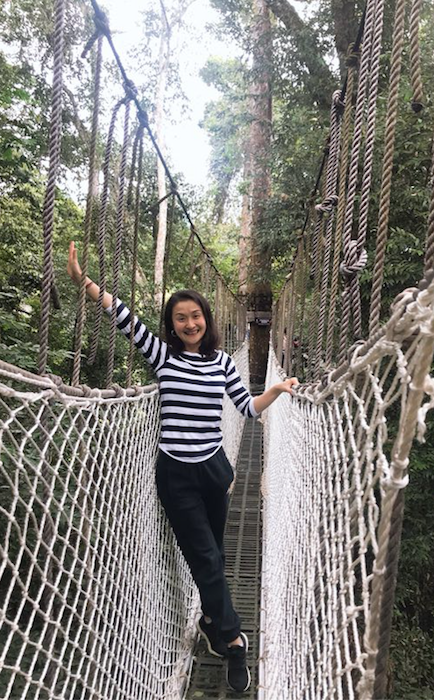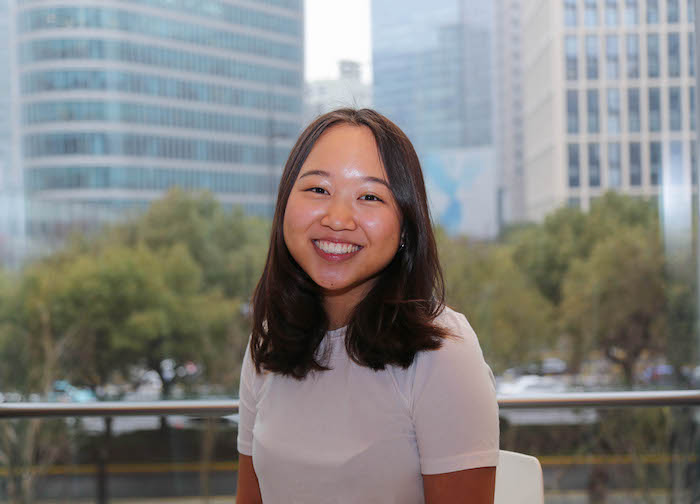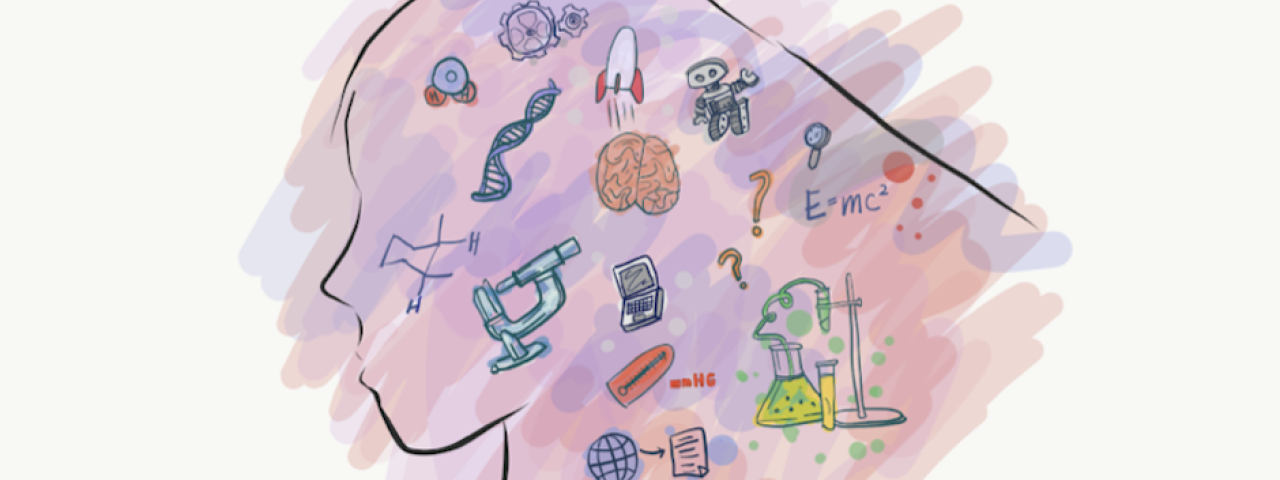
We asked seven NYU Shanghai women to share their stories and experiences working and studying in the STEM fields. In this piece, we hear from two computer scientists, a neural scientist, the Women Empowered in STEM club president, a neural science major/data science minor, a biology major, and a neuroscience postdoctoral fellow.
Students Khayla Black, Jessie Zhang, Emily Yip, professors Lihua Xu, Siyao Guo, Li Li, and postdoctoral fellow Evgeniya Lukinova tell us about what sparked their interest in science, their proudest achievements, and the work they’re doing now.
Guo Siyao, Assistant Professor, Computer Science
Hometown: Huaihua, Hunan Province, China
On research, epiphany, and beauty
I love research because it’s like walking in the dark and trying to figure out what is there. At some point, you gain a new understanding--a light that makes everything clear and reveals beauty--that is the best moment! Another important part of research is collaboration. We all have our own limits, and by putting people together and collaborating with different perspectives, we can create something much more powerful.
In my own research, I ask questions about computers. We know computers can solve many problems very quickly, but I want to understand what problems they cannot solve and what problems are easy or hard for computers to solve. Once I understand something new, I become a stronger, better person. This process of self-discovery means that I keep growing.
Her advice for women starting out in STEM
I think the most important thing is: Don't be afraid, and try to reach beyond your limitations. Once you reach your limit, you can go further and further, and the right attitude is to do your best. I think the procedure is actually more important than the results.
I learned this from playing softball. After tons of games, that was my team’s attitude: If you complete every step and try your best and reach your limits, you will gain. Conversely, even if you win a game but you didn't play your personal best, you won’t feel great. Not giving up is a choice--you choose to be positive.
Jessie Zhang ‘21, Biology Major
Hometown: New York City, New York
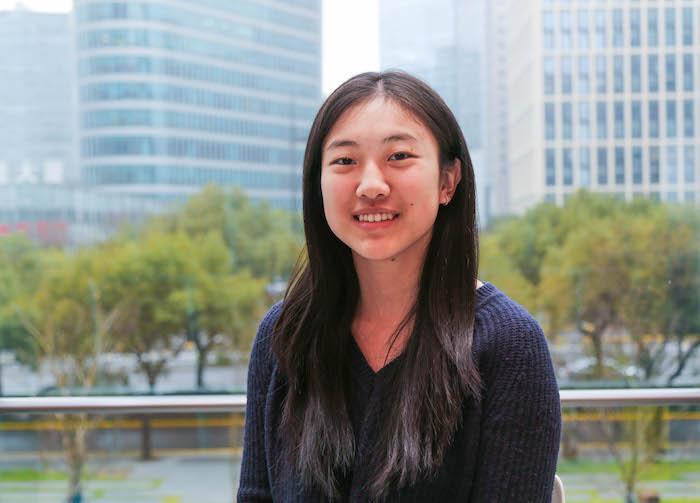
Why biology?
Scientific concepts have always been very interesting to me, like the Bohr model [for diagramming atoms], and the Schrodinger model [for predicting the location of electrons] -- I love learning about the history of these different theories and how they developed and continue to develop.
My interest really started in the 7th grade. For a good portion of my life, I thought my older brother had autism. I wasn't very informed on his condition, and it was only in 7th grade that I found out it was actually trisomy 9. I wanted to learn more about trisomy and became really interested in medicine, genetics, and biology as a whole.
I currently do research in my professor’s lab at ECNU, and I’m learning a lot about different techniques that I haven’t seen in my biology lab classes yet, such as double enzyme digestion or yeast two hybrid assay. I also volunteer and shadow when I go back home to New York. Last summer I volunteered in the ER, and over this past winter break, I shadowed a doctor. Being in a doctor’s cubicle for several hours a day really changes your perspective. I felt motivated to talk to residents and doctors and to envision myself as part of that community.
On making STEM more visible and accessible
I’m currently the president of NYU Shanghai’s weSTEM club--Women Empowered in STEM. We want to make STEM approachable and inclusive for everyone, so we had a week of STEM events called ‘It’s not Rocket Science!’ from March 11 to 14. To show that STEM can be fun and interesting, we tried to come up with engaging and easily accessible ways of learning about STEM, like a VR display, a behavioral economics lecture, and writing secret messages with lemon juice.
I was actually inspired by NYU Abu Dhabi’s weSTEM club. I read an article about them holding a conference for female high schoolers to get involved in STEM, which I thought was really cool. I hope our weSTEM club can eventually reach that level of impact.
Her advice to future women in STEM
Just because it might seem like a “guy thing,” don't believe it when anyone tells you girls can't do it. Over the last few decades, gender distribution in science has evened out and will continue to even out. The people who staff our biology and chemistry labs at NYU Shanghai are mostly female. Just go upstairs and take a look. Move towards your goals step by step. You can at least try!
Khayla Nicole Black ‘22, Neural Science Major, Data Science Minor
Hometown: Bakersfield, California, USA

On her involvement with STEM
I spend a substantial amount of my free time volunteering with the International Youth Neuroscience Association, a global, youth-led nonprofit which provides students opportunities to explore neuroscience.
I serve as the Assistant Director of the MYELIN initiative, which provides students around the world with opportunities to study neuroscience by developing a high school neuroscience curriculum. I am also a junior editor for the International Youth Neuroscience Association Journal.
On campus I am an undergraduate research assistant for Professor Tim Byrnes in the Physics Department. His research deals specifically with quantum technologies. Throughout the course of the year, I have been focusing on stimulated-Raman adiabatic passage (STIRAP), one of many techniques allowing for selective population transfer between quantum states used in chemistry, physics, and information processing. Currently, I am working to utilize a shortcut approach to STIRAP to perform logic operations.
On her plans for the future
I recently got accepted into the National Institute of Health (NIH) summer internship program, so I’ll be spending my summer at the Eunice Kennedy Shriver National Institute of Child Health and Human Development (NICHD). My dream is to be a neuroscientist studying the molecular mechanisms of synaptic transmission at a university where I am able to teach neuroscience. I would also love to have some sort of larger role in education.
Xu Lihua, Associate Professor of Practice in Computer Science
Hometown: Jiangxi Province, China
A defining moment in her career
That was when I received the “Best New Investigator” award at the 2006 Grace Hopper Women in Computing conference. I was in the 2nd year of my graduate studies, and it was an eye-opening moment, meeting all of the big names in computer science, in computing basically. All of these women. We had seminars talking about the issues women encounter in academia, and seminars teaching younger women who were just getting involved in the field how to balance midnight lab sessions with home life. From that moment, I wanted to be a teacher. That's why my career path has always been teaching in universities, because I want to let other girls know it's okay to pursue sciences, just prepare yourself and be persistent with your passion.
On passing on knowledge in the classroom
I was lucky because my PhD advisor Debra Richardson was really keen on diversity in the lab environment, so we always had about half female students and half male students in the lab. She was the one who motivated me and showed me that being a woman in computer science and in the technology field particularly, you can still have everything--your life and your work.
Now, I teach my students how to collaboratively work with peers, starting from zero. They collect requirements from a potential client and then deliver a final working product for a customer. One example is an auto-grader project that students developed last semester. We are planning to deploy and use this for our intro courses to automatically grade students' homework exercises.
Emily Yip ‘21, Biology Major
Hometown: San Francisco, California, USA
On new perspectives gained in class
I took a Medicine and Disease class last semester for Perspectives on Humanities, and it allowed me to gain a new perspective on the whole field of medicine. I was exposed to the unspoken challenges and unexpected twists and turns through reading several case studies on individual experiences.
One story that stuck out to me particularly was about a Hmong couple from Laos that immigrated to Davis, California whose infant daughter was schizophrenic. They sought out help for their daughter from the local hospital, but due to complications--a lack of understanding between cultural differences in medicine and a wide language barrier--the parents chose not to give their child her medicine and, the girl’s condition worsened. In the end, the daughter’s appointed doctor wrote to child protection services, and she was taken from the parents against their will. Reading about these kinds of incidents made me realize that physician and patient relationships go beyond science and medicine and require cross-cultural understanding.
On her inspirations
My sister and I were raised by my mom in an all-female household. I would say that I was lucky to grow up in a supportive environment full of strong women who never made me feel as if pursuing STEM wasn’t accomplishable. I look up to my sister who is currently in dental school at Tufts—she tells me stories about how she dissects human cadavers in class and how her service trips to Haiti and the Dominican Republic have shaped her perspective on improving public health. I also gained interest in pursuing medicine from watching doctor-based TV shows such as “Grey’s Anatomy,”“Descendants of the Sun,” and “Doctor Stranger.” Even though what is portrayed in TV shows is often unrealistic, there's undeniably still truth grounded in the impact of helping others through health and medicine. Realizing the importance of biology and its impact on others beyond the classroom has helped reinforce my interest of pursuing medicine, and I feel supported by the tight-knit STEM community everyday here at NYU Shanghai.
Evgeniya Lukinova, Postdoctoral Fellow in Neuroscience
Hometown: Dolgoprudny, Russia
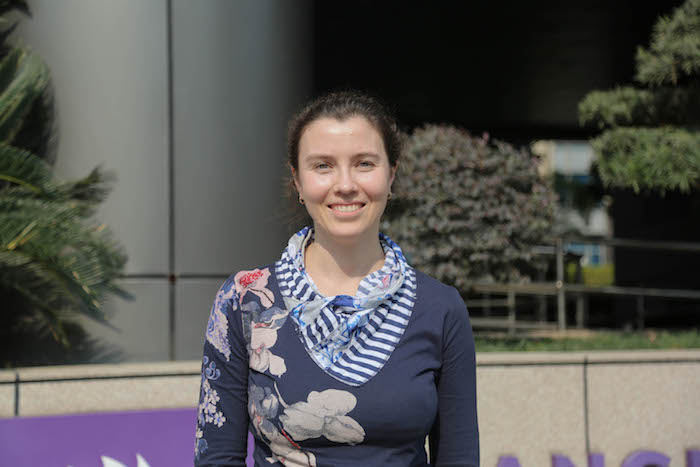
On being persistent
When I was doing my masters in economics, I took part in a neuroscience seminar and knew I wanted to start something that merged the two fields. I thought: without a background in biology, what would I do with neuroscience? How do I start? I proposed some sets of experiments using an fMRI to my professor at that time. An fMRI experiment costs $500 per scan an hour, so your experiments not only need to be good, but you also need to be able to use its analysis for other purposes later.
When I talked to the psychology professor who was doing research in fMRI, he told me, “Don't do that. You'll spoil your PhD career.” I was on my third year of my PhD, and he was saying: Don’t even try, it’s too expensive. But in a month, I came to him with my pilot data and some analysis, and he was amazed! I don’t think it’s a professor’s first inclination to suppress anyone’s ambitions, but if they work with many ambitious people, they expect you to think things through more and challenge you to work harder. It’s something you need to overcome.
On communicating across disciplines
A woman who inspired me a lot to get closer to neuroeconomics is Uma Karmarkar. She was at Harvard business school at the time, but she has two PhDs--one in neuroscience and one in management science. So I was talking to her and telling her, “As a political science PhD, I'm overlooked by economists who think I'm not an economist, and I'm overlooked by neuroscientists who wonder what I’m doing in their field.’” She told me, “If you're good at what you're doing, it doesn't matter what your PhD is in. What matters is that you actually do your work, you build necessary connections, and you use the language of those research fields. You first try to communicate, then you start to use their models, their methods.”
Li Li, Professor of Neural Science and Psychology
Hometown: Lanzhou, China
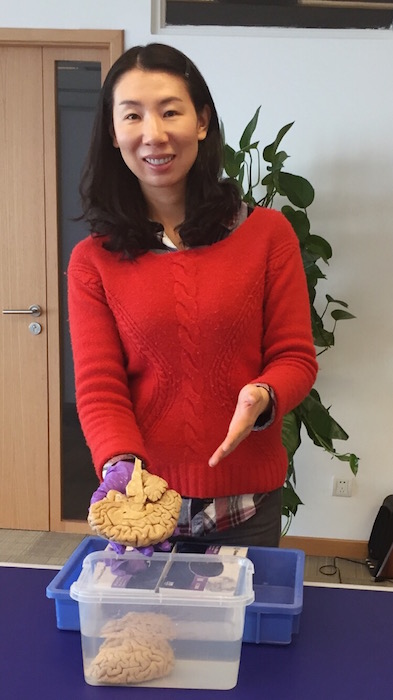
On knowing your strengths
I teach Perception, which is a neuroscience elective made up largely of neuroscience and psychology students. What I want my students to take away from my teaching is that it’s important to utilize your forté. Know your strengths and try to build your career to emphasize those strengths.
On research and delayed gratification
It took me a while to really find out what I wanted. Even when I started my PhD program, I was not at first thinking of becoming a professor. I started out working for a consulting firm, and I realized that my strength in research would be better suited to teaching than consulting. Passion is important especially for research, because research is not about instant gratification. Maybe only years later people will recognize your research contribution and only if you are truly interested in your subject will you be able to keep on going.
--
Find out more about STEM majors at NYU Shanghai here


